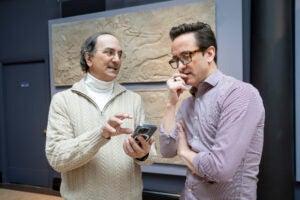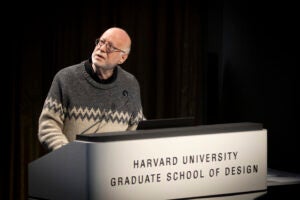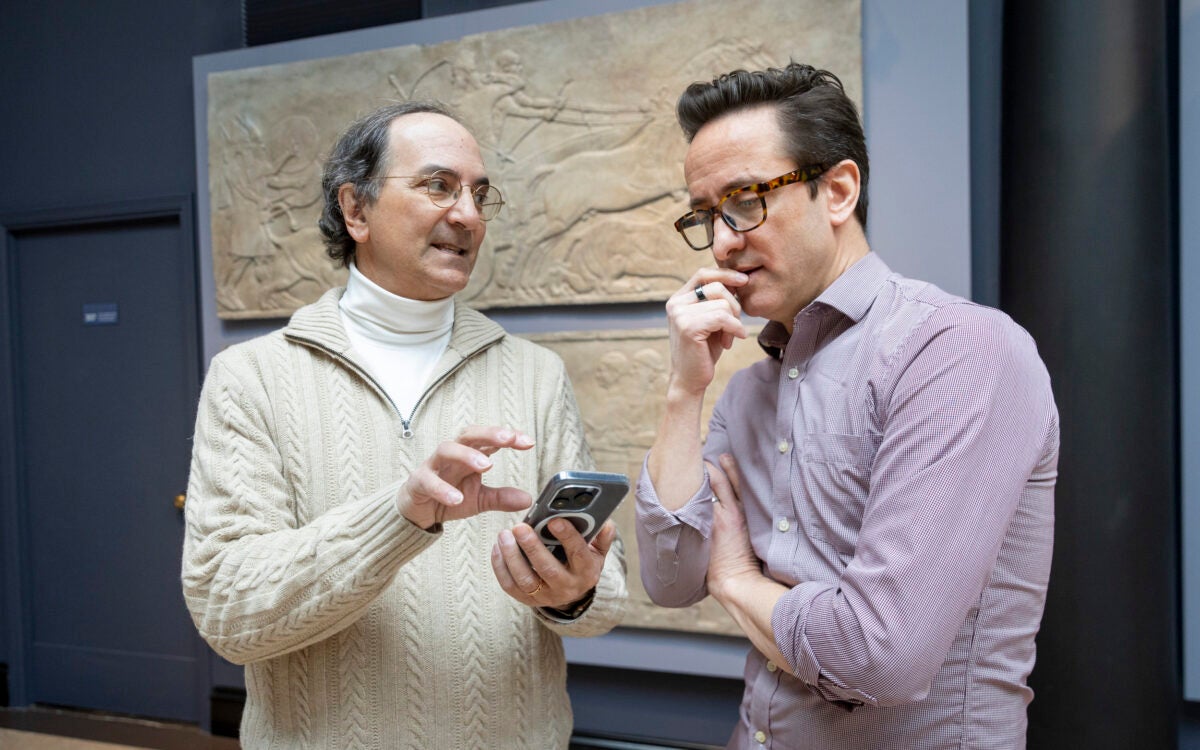Tackling tradition and taboos
Bridge Builders bring grassroots experience to Harvard
Mary Gitagno plainly remembers the pain of her traditional Tanzanian tribe’s female circumcision ritual. It is a pain she determined her own daughters would never feel.
In the years since, Gitagno went far beyond sparing her daughters from female genital mutilation, beginning a nonprofit organization to lobby the government and educate the public about the dangers of such practices.
Although female circumcision is outlawed today in Tanzania, it is still routinely practiced in some parts of the country, where traditional views of sexuality and women’s role in society are still firmly held.
“In our tribe, women are commodities. They work for men,” Gitagno said.
Gitagno told her story to about 40 people gathered at the John F. Kennedy School of Government’s Bell Hall Monday afternoon (Feb. 26) for the opening panel in the weeklong Bridge Builders Conference.
Gitagno joined Indian nun Sudha Vargese, who works to improve the lot of India’s “untouchables,” and Gambian women’s rights activist Nyima Jarju for a discussion moderated by Rohini Pande, the Mohamed Kamal Professor of Public Policy at the Kennedy School.
The International Bridge Builders Conference is an annual, student-run event that brings a handful of grassroots organizers from around the world for a week of both learning and teaching at Harvard, according to conference co-chair Chris Sutton, a master’s in public policy student at the Kennedy School. Monday’s event was co-sponsored by the conference and the Women and Public Policy Program.
The Bridge Builders Conference presents both public events where the Bridge Builders share their own frontline experience with the Harvard community and private classroom sessions where the Bridge Builders hear from Harvard faculty about topics such as fundraising, leadership development, and strategic management.
Gitagno said she began her organization, the Hanang Women’s Counseling Development Association, to provide education, training, legal aid, and other needed services to women.
“We had a vision of realizing a peaceful society that respects … women and children,” Gitagno said.
She said the group has several objectives, including aid for women who are battered, but main among them is ending female genital mutilation, the practice of removing a girl’s clitoris and, in some cases, the labia as well. Traditional views dictate that girls be circumcised before age 18, she said, and that those who are not are at risk of becoming promiscuous as adults and will have difficulty finding a husband. Even among women, there is a belief one must undergo the procedure as a rite of passage to become a woman, Gitagno said.
Gitagno said the procedure, conducted without anesthesia, is done with one razor blade shared among a group of girls, and bears the risk of tetanus, HIV, and other bloodborne disease. Some who undergo the procedure bleed to death, she said. Infections and absence of sexual pleasure are additional problems.
The World Health Organization indicates that the practice of female genital mutilation extends beyond Tanzania and estimates that between 100 million and 120 million women and girls in the world today have undergone some variation of the procedure. Another 2 million girls each year are at risk.
Because literacy is low in her home area, Gitagno developed songs and dramas to help teach that the genital mutilation is unnecessary.
“There are many, many challenges in overcoming traditional beliefs and this custom,” she said.
With increasing pressure to cease the practice, Gitagno said people are performing it on younger and younger girls, as small as 3 months, making it difficult to detect and to stop.
Nyima Jarju has worked for women’s rights as a representative from the Kombo Central District on the Western Division Council in The Gambia. She organized her district’s participation in a national march on the capital to raise awareness of women’s issues. As the only woman on her village’s Village Development Committee, Jarju is helping local women develop economic skills through tie-dyeing and designing batiks, making soap and lotion, and sewing.
Jarju said the efforts helped provide access to capital for the women and helped them develop economically valuable skills.
The first time Sister Sudha Vargese visited the area of India in which she would work with the poor, the filth and the flies almost turned her back, she said. She had sought out the lowest of the untouchable caste, the Mushar, in India’s Bihar state in January 1986.
Vargese stayed, getting to know the community. Literacy is almost nonexistent – just 4 percent for men and 0.9 percent for women. Though untouchability is officially banned, Vargese said it is still practiced, with some hotels out of bounds for untouchables and separate cups kept at tea shops.
Girls, she said, typically marry at 12 or 13 and have five or six children by age 30, with high mortality among these children. Their life expectancy is just 40, she said. Alcoholism is common among men, she said, and women head the households.
Vargese said she realized that teenage girls who would grow up to head households might be a good way to effect change in the community. She began a group for teenage girls in her home, teaching them functional literacy, sewing, and embroidery. After two years, she got a grant from UNICEF to open five centers in other villages, where the program included vocational training, literacy, nutrition, sanitation, and money management.
The organization continued to grow and now has 50 centers involving 1,500 girls, Vargese said.
After the girls spend two years in her program, they move over to the government schools, Vargese said.
“I have a lot of hope that this group of girls will be agents for changing the community,” Vargese said.




